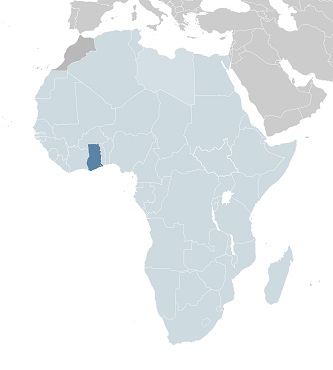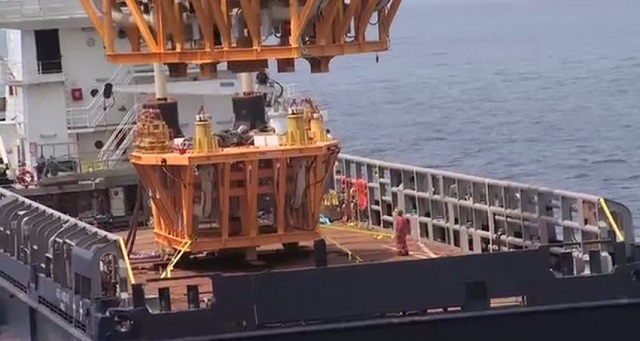Ghana is Rapidly Growing into a Maritime Hub

Government and industry groups are working together to establish Ghana as a key player in the maritime sector. Together they are developing the country’s institutions, infrastructure and regulatory landscape and strengthening ties for the delivery of goods and services internationally and across Africa.
 “Ghana has an abundance of natural resources, greater economic transparency and political stability than many of its neighbors, as well as progressive approach to stimulating growth, investment and opportunity,” says Erland Ebbersten, group vice president for Africa, Russia and Central Asia at the GAC Group.
“Ghana has an abundance of natural resources, greater economic transparency and political stability than many of its neighbors, as well as progressive approach to stimulating growth, investment and opportunity,” says Erland Ebbersten, group vice president for Africa, Russia and Central Asia at the GAC Group.
“Its reliable business infrastructure and investor-friendly climate makes it easier to do business here than in many emerging economies. It’s also safe, secure and does not suffer from significant security threats.”
Ghana’s economy is growing rapidly due to promising investment opportunities within the region, largely driven by service-orientated sectors. The country is forecast to have GDP growth of around five percent this year, powered by a rapidly expanding middle-class.
Potential for growth is significant, particularly in the shipping, logistics and offshore services sectors, says Ebbersten. Given the emphasis on improving the transport infrastructure from ports to border regions, and increased efforts to centralize funds, simplify regulations and reduce bureaucracy, Ghana is firmly establishing itself as a leading maritime and logistics hub, and is catching up with countries like Nigeria.
“There has been a significant increase in demand for offshore support vessels and services for the oil and gas sector. This includes support for seismic surveys, which generate additional requirements for crew support, ship supply services and hub agency services. Oil and gas is a growing market - Ghana currently produces 100,000 barrels of oil per day – but production is still on a much smaller scale than in, for example, Nigeria, which produces 2.3-2.5 million barrels daily.”
 Ghana has developed a regulated ship-to-ship transfer zone off the Port of Tema, which GAC’s partner OMA has been appointed to manage by the Ghana Ports and Harbour Authority. Already this year, they have performed around 40 ship-to-ship transfers, while some oil majors have conducted their own.
Ghana has developed a regulated ship-to-ship transfer zone off the Port of Tema, which GAC’s partner OMA has been appointed to manage by the Ghana Ports and Harbour Authority. Already this year, they have performed around 40 ship-to-ship transfers, while some oil majors have conducted their own.
“This is an interesting development in the continued migration of ship-to-ship transfer services across West Africa over the past five years and demand is on the rise in Ghana,” says Ebbersten. “While Nigeria, Benin, Togo and Ghana all need to import petroleum products, there has been a shift of ship-to-ship hubs from Nigeria in response to the increased risk of sea crime, initially to Benin and later to Togo, which is now the main ship-to-ship transfer zone in the region.”
As the appointed agent for Hapag Lloyd in Ghana, GAC handles a significant volume of liner traffic at the country’s main ports. There has also been marked growth in non-liner activity, particularly RoRo and commodity bulk trades including cement and rice, to meet the changing needs of Ghana’s growing economy. The main industrial exports in Ghana are still high value minerals such as gold and seasonal agricultural commodities like cocoa, one of the staples of the Ghanaian economy.
Ghanaian waters have been relatively peaceful compared to the Gulf of Aden and Gulf of Guinea. Its waters are patrolled by the Ghanaian Navy and associated authorities who are vigilant to the threat and actively involved in protecting vessels within territorial waters.
However, working in Ghana still has its day-to-day challenges. “There is a need to develop and improve port and wider transport infrastructures to position the country as a leading shipping and logistics hub. New investments aimed at bolstering Ghana’s maritime services sector should ease some of this pressure, along with a pronounced drive to increase investment in education and training. This is an important move in developing Ghana as a skills center, for which it certainly has the potential,” says Ebbersten.
“While ideally placed geographically, to remain competitive Ghana needs to focus on delivering services efficiently, reliably and with the same rigor and attention to detail that you’d expect in other leading global maritime and transportation hubs. This is why we operate to the high standards set by GAC Group worldwide. ”
GAC works at Ghana’s main ports, including Tema and Takoradi through which more than 90 percent of foreign trade volume into and out of Ghana passes. Tema is also an important transit hub for cargoes destined for neighboring countries like Burkina Faso, Mali and Niger. The company also provides services at the terminal of the recently developed Jubilee oil field and works with ship owners and offshore installation operators to provide experienced Ghanaian marine crew in compliance with local requirements and labor laws. GAC also has offices in Nigeria, Angola, Congo and South Africa, and works with verified agents throughout the region including Cameroon, Gabon, Guinea, Liberia and Sierra Leone.

The opinions expressed herein are the author's and not necessarily those of The Maritime Executive.
